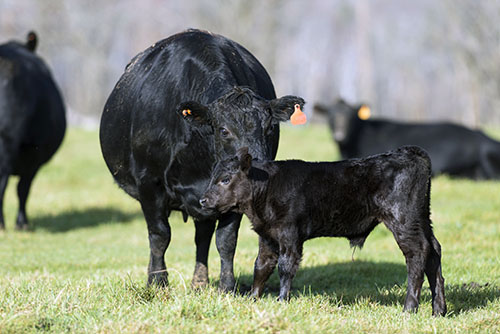The Importance of Electrolytes for Calves
Oct 11, 2021

by Daniel Brummel, Manna Pro
Raising calves is an enjoyable experience, but it also requires attention to detail. Feeding an electrolyte supplement to stay ahead of health challenges should be a standard practice for bottle-fed calves.
What is an Electrolyte Supplement?
Calves need to maintain fluid balance to stay healthy and grow. Electrolyte supplements contain electrolytes, energy, and amino acids to help replenish lost energy and fluids.
What Ingredients Should I Look For in an Electrolyte?
Electrolytes are blends of acids, bases or salts. These could include sodium, potassium, calcium, magnesium and chloride. Sodium is the main electrolyte found in body fluids and is involved in fluid balance and blood pressure control.
When choosing an electrolyte, look for these key ingredients and nutrients:
When Should I Feed Electrolytes?
Young calves can experience a variety of stressors. Feeding an electrolyte at the onset of any stressor will help your calves overcome challenges quickly.
Common stressors include:
How often should I feed electrolytes?
Feed electrolytes in addition to regular milk feedings. Always feed electrolytes separately from milk, as calves need the additional fluid and energy.
Continue feeding electrolytes for two to three days, until scours have stopped and hydration is normal, or as directed by your veterinarian. It’s also important to offer electrolytes in addition to fresh clean water. If severe dehydration occurs, calves will require intravenous therapy. If this happens, consult your veterinarian immediately.
Dehydration can be very serious in young animals. Staying ahead of calf stressors and knowing when to feed an electrolyte can help keep your calves healthy and growing.
For more content like this, check out the latest issue of the Cooperator.
Raising calves is an enjoyable experience, but it also requires attention to detail. Feeding an electrolyte supplement to stay ahead of health challenges should be a standard practice for bottle-fed calves.
What is an Electrolyte Supplement?
Calves need to maintain fluid balance to stay healthy and grow. Electrolyte supplements contain electrolytes, energy, and amino acids to help replenish lost energy and fluids.
What Ingredients Should I Look For in an Electrolyte?
Electrolytes are blends of acids, bases or salts. These could include sodium, potassium, calcium, magnesium and chloride. Sodium is the main electrolyte found in body fluids and is involved in fluid balance and blood pressure control.
When choosing an electrolyte, look for these key ingredients and nutrients:
- Dextrose (glucose) provides high energy and aids in maintaining body condition and sodium absorption.
- Sodium bicarbonate is an alkalizing agent, which decreases metabolic acidosis and may provide energy. Do not feed bicarbonate directly or within a few hours after feeding milk, as it will interfere with the digestion of milk in the stomach. Bottle-feed an electrolyte between regular milk replacer feedings.
- Glycine is a nonessential amino acid shown to help enhance the absorption of glucose
- Look for key electrolytes such as sodium, potassium and chloride. These ingredients will help replace lost electrolytes.
When Should I Feed Electrolytes?
Young calves can experience a variety of stressors. Feeding an electrolyte at the onset of any stressor will help your calves overcome challenges quickly.
Common stressors include:
- Environmental changes
- Transport
- Exposure to new animals
- Management procedures (e.g., dehorning, castration or vaccination)
- Crowding
- Temperature fluctuations
- Reduction of feed intake
How often should I feed electrolytes?
Feed electrolytes in addition to regular milk feedings. Always feed electrolytes separately from milk, as calves need the additional fluid and energy.
Continue feeding electrolytes for two to three days, until scours have stopped and hydration is normal, or as directed by your veterinarian. It’s also important to offer electrolytes in addition to fresh clean water. If severe dehydration occurs, calves will require intravenous therapy. If this happens, consult your veterinarian immediately.
Dehydration can be very serious in young animals. Staying ahead of calf stressors and knowing when to feed an electrolyte can help keep your calves healthy and growing.
For more content like this, check out the latest issue of the Cooperator.